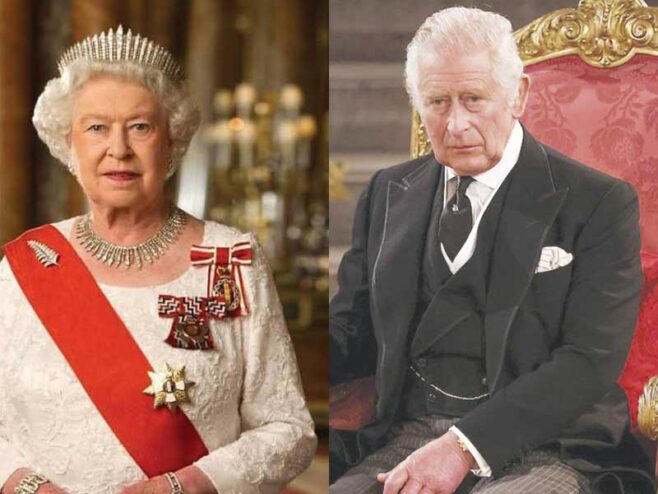The world is mourning the death of Queen Elizabeth II, U.K.’s longest-serving monarch, who died on September 8 at the age of 96.
Queen Elizabeth, whose reign spanned 70 years, was succeeded to the throne by her eldest son Charles, who has been proclaimed as King Charles III.
The state funeral for Queen Elizabeth is on September 19.
The Queen’s state funeral will take place at Westminster Abbey. A procession will take the Queen’s coffin from Westminster Abbey to St. George’s Chapel at Windsor Castle. She will be buried in the King George VI memorial chapel alongside her parents, her sister, Princess Margaret, and husband Prince Philip, during a private service for Royal Family members.
In addition to the United Kingdom, the Queen is head of state of 14 other countries, referred to as “Realms”.
These are Canada, Antigua and Barbuda, Australia, Bahamas, Belize, Grenada, Jamaica, New Zealand, Papua New Guinea, Saint Kitts and Nevis, Saint Lucia, Saint Vincent and the Grenadines, Solomon Islands, and Tuvalu.
The Queen died at her Scottish estate in Balmoral, where she had spent much of the summer.
The Queen came to the throne in 1952.
King Charles III, aged 73, said the death of his beloved mother was a “moment of great sadness” for him and his family.
The King said that her loss would be “deeply felt” around the world.
He said: “We mourn profoundly the passing of a cherished sovereign and a much-loved mother.
“I know her loss will be deeply felt throughout the country, the realms and the Commonwealth, and by countless people around the world.”
The King said he and his family would be “comforted and sustained by our knowledge of the respect and deep affection in which the Queen was so widely held”.
King Charles III’s wife Camilla is now Queen Consort.
British Prime Minister Liz Truss, who was appointed by the Queen on September 6, said the monarch was the rock on which modern Britain was built, who had “provided us with the stability and strength that we needed”.
Speaking about the new King, she said: “We offer him our loyalty and devotion, just as his mother devoted so much, to so many, for so long.
European monarchs joined the outpouring of mourning, with messages from kings of the Netherlands, Sweden, Norway and Spain.
“With sadness, my family and I have today received the news that my dear relative, Her Majesty Queen Elizabeth II, has passed away,” King Carl XVI Gustaf of Sweden said.
“Your mother was very important to me and my family. She was a towering figure among the European monarchs and a great inspiration to us all. We shall miss her terribly,” Danish Queen Margrethe wrote to the new King Charles.
Canadian Prime Minister Justin Trudeau joined heads of governments in expressing condolences.
“She was our queen for almost half of Canada’s existence and she had an obvious deep and abiding love and affection for Canadians,” Trudeau said.
“She was one of my favorite people in the world, and I will miss her so,” Trudeau also said.
On September 10, Canada proclaimed Charles its king in a formal ceremony at the official residence in Ottawa of the governor general, the monarch’s representative in Canada who performs the duties of the head of state on behalf of the crown.
Canada ceased being a colony of Britain in 1867. The country remained in the British Empire until 1982, and is still a member of the Commonwealth of former empire countries that have the British monarch as head of state.
Trudeau and Governor General Mary Simon signed an order in council proclaiming the new sovereign after a Cabinet meeting.
The order was read by Canada’s Chief Herald Samy Khalid.
“We … proclaim that His Royal Highness Prince Charles Phillip Arthur George is now, by the death of our late sovereign, Charles III, by the grace of God with the United Kingdom, Canada and his other realms and territories, King,” Khalid read in front of Rideau Hall.
Canada will mark the death of Queen Elizabeth with a national day of mourning on September 19.
The holiday will coincide with the queen’s funeral in London, U.K.
Trudeau has proclaimed September 19 as a federal holiday.
A federal holiday normally applies to public servants and federally regulated workers.
British Columbia announced that will follow the federal government’s lead to observe the national day of mourning to mark the Queen’s funeral.
“K-12 public schools and public post-secondary institutions, and most Crown corporations will be closed,” said B.C. Premier John Horgan in a statement.
Horgan added, “We encourage private-sector employers to find a way to recognize or reflect on the day in a way that is appropriate for their employees.”








